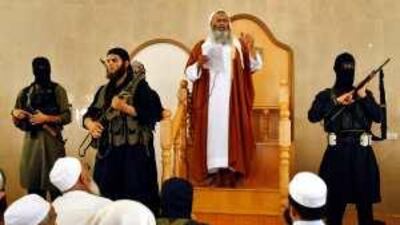RAMALLAH // Hamas security forces killed the leader of a radical Islamist group in Rafah in fighting yesterday and Friday that claimed the lives of 22 people. More than 150 people were also wounded in seven hours of fighting that erupted Friday evening after Abdel Latif Mousa declared Rafah to be an Islamic emirate and took over a mosque with some 100 followers of his group, Jund Ansar Allah, or Soldiers of the Companions of God.
By Saturday, the Brazil refugee camp in Rafah, right on the border with Egypt where the fighting took place, was closed to the media and public as Hamas security forces swept the area. Hamas officials said order had been restored and that most members of the group had been arrested or killed. "This gang has been active for three or four years and adopted the ideas of radical groups like al Qa'eda," said Ghazi Hamad, a Hamas official from Rafah.
Hamas officials have blamed the group for a string of violent incidents in the Gaza Strip over the last year, including the firebombing of DVD shops and internet cafes as well as the bombing last month of a wedding of a relative of Mohammad Dahlan, a senior Fatah leader and former Gaza security chief, in which over 50 people were wounded. Mr Hamad said Hamas had now sent a "strong message" to similar groups that "it is better to live peacefully with others in Gaza and not use violence".
Jund Ansar Allah had accused Hamas of being too liberal and wanted a strict enforcement of Islamic law in the Gaza Strip. Mousa was also unhappy that Hamas has maintained an unofficial ceasefire with Israel since January and urged his followers to engage in a global jihad, in contrast to Hamas, which maintains its struggle is solely against the Israeli occupation. Mr Hamad said Hamas had tried to mediate with Mousa since Tuesday, to ask him to stop inciting against Hamas and the government in Gaza. But in his Friday sermon, Mousa declared Rafah an Islamic emirate that would now follow strict Islamic law and, with some 100 armed followers, he took over the mosque in the Brazil camp.
Hamas forces surrounded the area and deployed rocket-propelled grenades and other heavy weaponry against houses in the Brazil camp that had been taken over by Jund Ansar Allah fighters, themselves heavily armed. Six civilians, including an 11-year-old girl, as well as seven Hamas troops were among the dead. Reports suggest that Jund Ansar Allah had headquartered itself in the camp because it had its own smuggling tunnel there under the border to Egypt. Hamas has prided itself on restoring order to what had been frequently lawless streets in Gaza before the movement ousted Fatah-affiliated security forces in June 2007. It has subsequently shown little tolerance for armed groups that have defied its ban on carrying weapons in public or have used them for anything other than against Israeli targets.
In September 2008, 11 people were killed when Hamas forces overran a stronghold for the Doghmush family in Gaza, a powerful tribe with both criminal and jihadist links. Members of the Doghmush clan, the so-called Army of Islam, had in 2007 abducted Alan Johnson, a BBC journalist, an incident that served as the first test of Hamas's ability to impose order. Under British pressure, a deal was struck for the journalist's peaceful release, but there was little doubt that Hamas was biding its time before clamping down on the group.
The clashes with Jund Ansar Allah reveal some of the friction that has arisen between Hamas and radical Islamic groups who believe Hamas has allowed itself to be a nationalist movement first and an Islamic movement only second. It also shows that Hamas is willing and able to crack down on these groups if it feels its authority is threatened. "We tried to defuse this situation, but Mousa did not listen to anyone," said Mr Hamad.
"Hamas cannot accept any group that promotes such radical ideology. Hamas is a moderate force. This is something that must be understood by the international community." @Email:okarmi@thenational.ae

